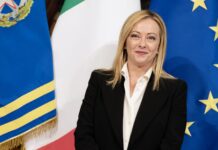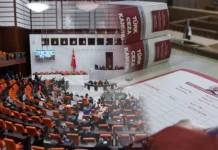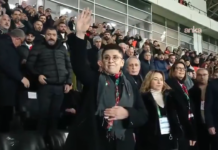[11th August 2015] For once, I am going to write first in English, and then (if I can find the time) translate my own article back into Turkish.
This is because, like Adam McConnel, I too am getting fed up with the Western media’s brazen insistence on, and the various sophisticated ways (like insinuation, neglect, oversight, outright omission, bending the truth however slightly, or blatantly false chronological sequencing) they have developed for, lying, lying, and lying yet again about Turkey.
My title takes off from perhaps the greatest of all British World War I poems — Wilfred Owen’s Dulce et decorum est (which is translatable as “it is sweet and becoming”). In turn, this is part of a quotation from an ode by the Roman poet Horace, which reads in full: Dulce et decorum est pro patria mori. That is to say, “It is sweet and becoming to die for one’s country.” It is a line that over a century or more, most English elite schoolchildren, including Owen’s own generation, would have learned and memorized in the original Latin as part of their Classics education.
Having himself started out as a credulous patriot, but then having turned bitterly anti-war after three years in the trenches on the not-so-quiet Western Front, in the poem Owen finds himself walking behind a wagon into which they had flung a comrade suffering from chlorine gas, who is now coughing up his frothing lungs in piece after bloody piece. Inwardly burning in helpless rage against all nationalistic demagogues for their warmongering speeches, he addresses an unknown, an abstract “you… my friend” (pointing forward to Erich Maria Remarque’s own 1928 deconstruction of the pompous gymnasium history teacher Kantorek in All Quiet on the Western Front), to whisper, in sobbing cadences of sorrow, that if such people were ever to experience the actual horrors of the battlefield, they
… would not tell with such high zest
To children ardent for some desperate glory,
The old Lie; Dulce et Decorum est
Pro patria mori.
So yes, while in Owen’s case to keep repeating that “it is sweet and becoming to die for one’s country” can come across as nothing but an “old Lie,” in other situations while the content changes it can now be the entire style or manner of speaking or writing that itself adds up to a sweet and becoming way of lying.
For the second time in a fortnight, this has to do with the BBC’s way of cheating and misinforming its audience about just who is responsible for the recent resurgence of the Kurdish war in Turkey. Thus on 27th July, in what was posted as a summary of “The week that changed Turkey,” the BBC used two different languages for reporting about a variety of incidents. Some were presented as absolute truth while others were made out to be at least doubtful. With regard to the Suruç bombing, for example, the wording was unambiguous: thirty-two people “are killed,” it said, by IS-linked militants. Also clearcut was the “shoot[ing] dead” of a Turkish border guard by IS forces. But then there came the following strange turn of phrase: “Meanwhile the PKK reportedly kills two Turkish police officers in retaliation for Suruç…” Why “reportedly,” since there was no doubt whatsoever that the PKK did it, and that furthermore it proudly owned up to having done so on its own HPG (armed wing) web site? And why did the BBC not attribute the “in retaliation for Suruç” bit directly to the PKK, leaving it open as if it were a matter of interpretation — despite the fact that precisely that phrase had been utilized by the HPG in its action report? Two days later and as reported three lines below, Turkey did begin hitting not only IS targets in Syria but also PKK targets in Iraq. But why did the BBC not connect these bombing to the killing of the two policemen? Had the de facto truce of the last two years or more not ended then and there with these two very deliberate, cold-blooded murders (with a team of so-called Apo’s [Öcalan’s] Fedayeen breaking in late at night and using silencers to shoot the two sleeping policemen in the back of their heads)? Why, instead, did the BBC see fit to to paraphrase the PKK as saying only then that “the conditions are no longer in place to observe a ceasefire”? What was behind all these euphemisms and equivocations? At the end of the day, didn’t they boil down to glossing over the PKK’s very real initiative in resuming the “armed struggle” while shifting the blame to the government? If this wasn’t biased and tendentious reporting, what was or is? — These were some of the questions I asked in a sarcastic, satirical Serbestiyet article the very next day, which however was available only in Turkish (Kompozisyon ödevi (BBC’nin örnek dil kullanımı), 28th July 2015), though Essay topic: the BBC’s exemplary use of language might have been a sufficiently facetious translation.
That was exactly two weeks ago. Yesterday, i.e. on 10th August, the BBC saw fit to report more extensively on the escalation of PKK violence. Under the very awkward title of Turkey attacks: Deadly violence in Istanbul and Sirnak, which at least some people would be prone to reading not as attacks happening in Turkey but Turkey attacking here and there, they do recount the PKK’s Şırnak bomb blast that left four policemen dead, also the PKK’s rocket attack on an army helicopter that killed a soldier, and the detonation of a PKK car bomb in Istanbul’s Sultanbeyli district that injured ten people including another three policemen. Then, however, we come to a piece of commentary that is supposed to inform readers of the background to or the connections between these events, to provide some sense of why they are happening. This is what I am quoting as the banner for this article. Just look at it. (a) Precisely as in the 27th July summary, they claim that the ceasefire disintegrated “when Turkey began bombing PKK camps in northern Iraq.” (b) They do not say anything, but anything, about what might have triggered that, or at least what Turkey’s explanation might be on that point. (c) Instead they only quote PKK leader Cemil Bayık so as to give us nothing but the PKK’s version. (d) According to Bayık, Turkey has started attacking the PKK for no other reason than wanting to help IS. The PKK has not been doing anything of or on its own, it seems; rather: “They are doing it to limit the PKK’s fight against IS. Turkey is protecting IS.” (e) Not only does the BBC quote this garbage, but actually tries to support and reinforce it in its next two editorial comments: Kurdish fighters including the PKK have been fighting and winning against IS, but strangely, for some unfathomable reason Turkey still regards the PKK as a terrorist organization.
This is as crass a pack of lies and distortions as I have recently read anywhere, including the one-sidedly anti-AKP section of the Turkish press. Indeed, you would be hard put to find anything in Hürriyet or Sözcü that would go so far as to absolve the PKK of any responsibility in the resumption of hostilities; as for the assertion that Turkey is attacking the PKK only in order to help and protect IS, you are not going to be able to find that one anywhere other than in PKK or HDP media outlets. The fact of the matter is, that from the BBC’s Europe section all the way up to its top editors, they have been sold, and are constantly being sold, one big lie that could be coming from their Turkish section — perhaps because the latter have themselves become so anti-AKP and anti-Erdoğan, or so emotionally aligned with those remnants of the Turkish left that through their obsolete fetishism of “revolutionary violence” have become uncritical apologists for the PKK, as to forget their own professional commitment to objective reporting. To the point of hiding from the British and generally Western public virtually all of the following well-known facts:
(1) On 11th July, the KCK, which is an umbrella organization for the PKK and its various branches, publicly declared that henceforth they would treat all road or dam or army outpost construction in the Kurdish region as having “military objectives,” and that therefore they would forcibly intervene against all such construction activity or work sites, and that moreover they would also retaliate against any attempt by the security forces to interfere with their (the KCK/PKK’s) interventions. This was widely interpreted in Turkish public opinion as tantamount to ending the de facto truce that had prevailed over the last two and a half years.
(2) Indeed, the PKK then did begin, virtually as soon as the KCK statement had been released, to set up roadblocks, undertake identity checks, burn long-haul TIR trucks and work machines – by way of positing itself as the sole indisputable, unchallengeable authority — at various locations in the East and Southeast.
(3) On 15th July, (Ms) Bese Hozat, co-chair (with Cemil Bayık) of the KCK, wrote a signed article, published in the Kurdish movement’s legal daily Özgür Gündem, openly stating that a new phase and process was beginning, which she called “the process of a new people’s revolutionary war.” This was actually the title of her article.
(4) Four days later, on 19th July Cemil Bayık, the KCK’s other co-chair, called on the Kurdish people to arm themselves in preparation for “self-defence,” including advocating imitation Vietcong tactics like digging tunnels beneath every village.
(5) The next day, i.e. on 20th July, there took place the Suruç explosion, where a single suicide bomber detonated himself in the midst of a group of left-wing youth, killing thirty-two in an act that had everybody pointing at IS.
(6) Nevertheless, the very next day (21st July) there appeared another Bese Hozat article in Özgür Gündem under the title “The AKP is responsible for the Pirsus [Suruç] massacre,” built entirely on the PKK’s oft-repeated but unfounded and unwarranted, designed to provoke the West against Turkey conflation of the AKP with IS.
(7) Taking Bese Hozat’s article as the truth, the whole truth, and nothing but the truth, the next day (22nd July) the PKK moved to (reportedly?!) kill those two policemen in Ceylanpınar, and proudly advertised the assassinations as “in retaliation for the Suruç massacre” on its HPG web site.
(8) Up till then, while it was the PKK that was repeatedly violating the truce and in fact baldly declaring it to be over, the Turkish government had taken no armed action against the PKK whatsoever. It was only after the frontal and impossible-to-overlook challenge of the murder of the two policemen that, starting on the 23rd, the Turkish air force started bombing Kandil and other PKK base areas in northern Iraq.
(9) This much can be said: (a) the PKK does not seem to have been prepared for the strength of the government response; perhaps because (b) it may have assumed, much too optimistically, that since it was (also) fighting against IS, it would continue to be regarded as an ally by the US in particular, which would then somehow intervene to shackle Turkey and protect the PKK from the full force of the counter-blow. This was completely erroneous, deluded thinking, fantasizing that the US might accord greater importance to its alliance with the PKK than with Turkey, and also not calculating the consequences of Turkey entering into direct military action, together with the rest of the US-led coalition, against IS. But especially when Turkey immediately starting bombing IS, too (as dictated by its rules of engagement in the aftermath of an IS killing of a Turkish border guard), while also opening the İncirlik air base to American and other coalition warplanes, all such paper-castles built in mid-air promptly collapsed.
(10) That is why the PKK, through its own leader Cemil Bayık as well as its minion Selahattin Demirtaş, co-chair of the HDP, has started coming up with this rather plaintive allegation about Turkey attacking the PKK only because the poor innocent guerrillas of the PKK have been doing nothing but virtuously fighting IS. It is a concoction purely for Western consumption — which the BBC appears to have liked so much as to grow a bit tipsy and woozy on.
It remains to ask why. But perhaps that is a question that their top editors and executives, as well as their European section, should be asking of the Turkish section: Why haven’t they been reporting on the correct order of especially points 1-8 above? Alternatively, why haven’t these and other points been reported by the BBC? Has the Turkish section been aware of them or not? Is it their reporting and passing on of information that has been amiss, or have they been suffering from editorial intervention at a higher level? Ultimately, how on earth can the BBC not know or properly identify just when, how and why the truce has collapsed? How can they just quote the PKK view without at least mentioning the Turkish government’s position? How can they possibly offer such editorial support for Cemil Bayık’s assertion that Turkey is retaliating against the PKK simply because the PKK is fighting IS?
Given what they wrote on 27th July and then repeated on 10th August about the ceasefire disintegrating because of the Turkish reaction, I for one am going to take a lot, a huge lot of persuading to bring myself to agree that such misinformation has not been deliberate.












